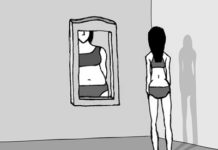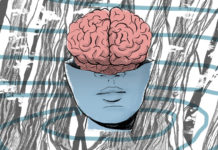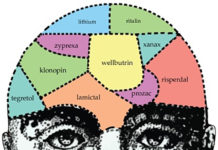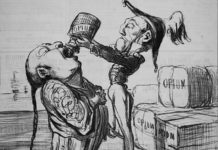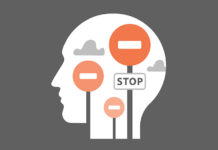The Language of Internalized Oppression
I realize many folks get irritated by the ‘moving target’ of language, but understand that this is a process of unlearning for us all. It’s not so much that the words randomly keep changing as it is that the oppression embedded in our words and ways of being runs deeper than most of us could have ever imagined. Unraveling it all is a long way off.
Childhood Emotional Abuse Associated with Internal Eating Disorder Voice
Many individuals diagnosed with eating disorders describe and internal ‘voice,’ which may be linked to experiences of childhood trauma and dissociation.
How Stigma and Social Factors Drive the Negative Health Outcomes Associated with Autism
A new study explores the interplay between social stress and quality of life for individuals self-identified with high-functioning autism.
Allen Frances and the Increasing Use of Antidepressants
Much of what Allen Frances says is sensible, but it would be more convincing if he would lay the responsibility for the present state of affairs squarely where it belongs: on psychiatry. I suggest, in all sincerity, that Dr. Frances abandon his attempt to absolve psychiatry from blame, and that he join the anti-psychiatry movement.
New Study Finds That Lavender Extract Eases Anxiety
A new study in Frontiers in Behavioral Neuroscience has found that the smell of lavender extract has an anxiolytic effect.
Correcting Misconceptions of Trauma-informed Care with Survivor Perspectives
Trauma-informed approaches have the potential to promote recovery but must involve survivors and service-users to prevent the experience of retraumatization within psychiatric and mental health services.
Psychiatric Marginalization of Anti-Authoritarians – Excerpt from New Book
Anti-authoritarians are a threat to authoritarians because they don’t provide unquestioning obedience, but instead first assess the legitimacy of authorities. Consequently, authoritarians have attempted to shun, punish and psychopathologize anti-authoritarians throughout history.
MIA Update: Our Parent Resources Initiative and More
Regular MIA readers may have noticed that we recently added a content box on the front page titled “Parent Resources.” This initiative has been a long time coming, and it is one that we hope will help us reach—and serve—a new group of readers. Many parents writing to us are desperately looking for a way out of the conventional system.
Are Depression Guidelines Missing the Evidence for Exercise?
A recent review suggests that depression guidelines do not incorporate evidence for exercise within a stepped-care approach and may be over-reliant on pharmacological treatments.
Suicide Hotlines, Risk Assessment and Rights: Whose Safety Matters?
The hotline “counselor” will tell you that, if you’re unable to keep yourself safe, they will have to send you some “help.” We all know that what they mean is not a friend or a therapist but the police. Because strangers, usually big white men with guns, keep everyone safe and are not triggering, traumatizing or on power trips at all.
Current Immigration Policies Create Mental Health Vulnerabilities for Families
Researchers investigate the impact of immigration policies on the mental health of arriving Mexican and Central American immigrants.
Global Mental Health – The Hypocrisy of Mental Health in The Age of Austerity
Dr. China Mills shares her reactions to recent events focused on Global Mental Health, elaborating on deeper issues with the framing of mental health as a “burden” and the underlying implications of coloniality, technology, and medicalization.
Huge Breakthrough in Lawsuits Against ECT Shock Device Manufacturers
A major electroconvulsive therapy case that was on the eve of trial just settled to the satisfaction of the injured ECT patients and the DK Law Group, LLP. As an expert in the case I am pleased to report that this is a significant victory. The evidence secured has paved the way for more suits against ECT manufacturers that are on the way.
About 1 in 100 Children Treated with Ritalin Experience a Serious Adverse Event
A recent Cochrane review has found that serious adverse events occur for about 1% of children and adolescents treated with Ritalin.
New Report Points to Gaps in the Evidence for Pediatric Bipolar Disorder
A new report on pediatric bipolar critically examines the current evidence base and calls for more research before the diagnosis is used.
How Our Government Helps Drug-Dealing Doctors Kill Us
In the 1800s, the British East India Company, aided by England’s parliament which invested in it, profited greatly by selling opium in China. This began what China calls its “century of humiliation” in which a great empire was brought to its knees. Are we at the start of our own lost century, with psych pill and opioid dispensers taking on the BEIC’s role?
Global Mental Health: An Old System Wearing New Clothes
On October 10th, 2018, World Mental Health Day, The Lancet Commission on Global Mental Health and Sustainable Development published a report outlining a proposal to “scale up” mental health care globally. In this podcast series, we discuss the implications.
Peruvian Legal Capacity Reform – Celebration and Analysis
Peru has moved closer to full compliance with the UN Convention on the Rights of Persons with Disabilities than any other country in the world. Here I analyze the Peruvian reform as it pertains to legal capacity and the right to be free from disability-based detention and forced medical interventions.
Gradual Tapering is Most Successful for Withdrawal from Antipsychotics
Mixed-Methods study explores the experiences of antipsychotic discontinuation among service users.
Do Family Interventions for Psychosis Translate in China?
Researchers explore how family interventions for psychosis might be adapted to China’s emerging integrated mental health care landscape.
55 Steps to Informed Consent
55 Steps is a new film based on a true story that centers around two women: Collette, a lawyer with a tendency to work long hours, and Eleanor, who has spent far too much time incarcerated in hospitals. Over the course of five years, Collette fights for Eleanor’s right to choose whether or not she takes psychiatric drugs. This film is imperfect, but its importance can’t be ignored.
The Conflicts That Result From Globalizing Euro-American Psychology in India
Researchers examine the transformation of work, life, and identity in India as a result of Western corporate and psychological culture.
Trauma Blocks the Frontal Lobes – “Verbal Physiotherapy” Can Unblock Them
Trauma makes the speech centers of the brain shut down. This is why talking about abuse is so difficult: the words are blocked. If you reclassify trauma effects as trauma-strokes, and you adapt physiotherapy to take this clinical evidence into account, then you come up with Verbal Physiotherapy.
Pooling Data May Hide Negative Outcomes for Antidepressants
A new study, published in Psychological Medicine, found evidence for a specific type of publication bias distorting the evidence about antidepressant efficacy.
The Connection Between Sleep, Exercise, Screen Time and Cognition in Childhood
Can current guidelines for sleep, exercise, and screen time in childhood be linked to positive cognitive outcomes?


